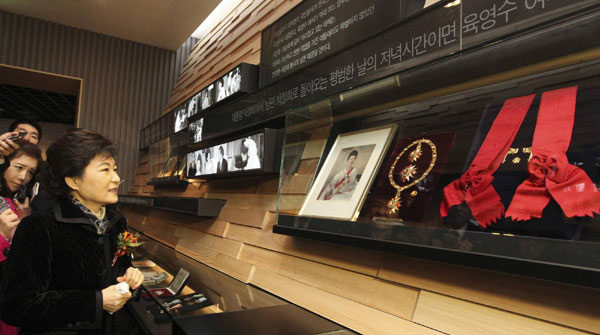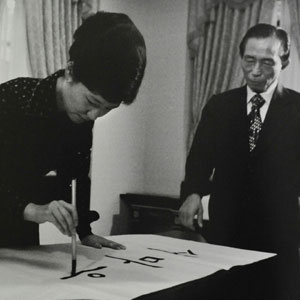
 |
|
Park Geun-hye (front L) looks at relics pertaining to her mother and the late first lady Yuk Young-soo at an opening of the Park Chung-hee Memorial-Library in Seoul in this Feb 21, 2012 file picture. Park Geun-hye was picked as the presidential candidate of the ruling conservative and right-wing Saenuri Party on Aug 20, 2012. [Photo/Agencies] |
Now, both hampered and helped by the contrasting legacies of her murdered parents, the 60-year-old Park appears on the cusp of becoming South Korea's first female president.
Park was chosen as presidential candidate for the ruling conservatives last week and polls show she is the front-runner for a December election.
 |
|
Park Geun-hye (L) uses a writing brush to write calligraphy as her father, the late South Korean President Park Chung-hee, looks on in Seoul in this Aug 31, 1977 picture which Reuters obtained Aug 27, 2012. Park Geun-hye was picked as the presidential candidate of the ruling conservative and right-wing Saenuri Party on Aug 20, 2012. [Photo/Agencies] |
For some South Koreans, it is the memory of Park's father, Park Chung-hee, that comes to mind when they think of her. His 18-year rule dragged the country out of poverty but at the cost of human rights.
He is still a controversial figure in the now-prosperous Asian industrial power. Park's opponents will aim to tar her with his brush in the election race.
But it is recollections of her mother, Yuk Young-soo, once known as "the mother of the nation", that look set to help propel Park into the presidential Blue House.
Yuk is remembered for acts of charity that included a famous visit to a leper colony where she shook hands and embraced the sick. She remains South Korea's most popular first lady by far, polls show.
For many South Koreans, Park's frugal lifestyle as a single woman living in a modest home in the capital, Seoul, as well as her simple clothes and 1970s hairstyle bring her mother to mind.
"Park looks like her mother, when she greets people and smiles," one supporter, Lee Young-ho, told Reuters, sitting under the curved roof of Yuk's old home in the town of Okcheon, where she lived until she married Park.
Lee should know.
A former soldier and Vietnam War veteran, Lee was a member of the presidential guard in the 1970s and worked closely with the Park family.
The traditional Korean house where Lee spoke has become a shrine to Yuk with hundreds of people visiting every day.
Lee, now 68, is an official with Park's New Frontier Party and has also co-authored a biography of Yuk.
He is confident Park can maintain her double-digit lead in the polls and win an election victory which, he says, would somehow make up for the sacrifices.
"A kind of debt can be paid back when Park becomes president."
Yuk was 49 when, on August 15, 1974, she was killed by a stray bullet when a pro-North Korean assassin opened fire at her husband. Witnesses said the skies turning "reddish-purple" upon her death.
Memorial ceremonies are held on the anniversary at her grave in Seoul and in Okcheon, 170 km (100 miles) from the capital. Thousands of people attend.
"MOTHER'S DREAM"
Although her family's story is so well known, woven as it is into the fabric of the country's modern history, Park herself, who made two previous bids to win the conservative presidential nomination, is deeply private and cautious about her politics.
She disappeared from public life in 1979 after the assassination of her father by his intelligence chief, only to resurface in 1997 to "help save" the country from a devastating Asian financial crisis.
She has never clearly defined her policies on issues such as taxation, spending and welfare. She says she shares her mother's vision of a more equal society and has pledged to work for that.
"It was my mother's dream and her dream is now mine," she said at her mother's memorial service this month.
Critics say she has failed to apologise sufficiently for her father's rule.
She said her father's 1961 coup was "unavoidable and the best possible choice". At the same time, she says she has always been "apologetic" to victims of her father's brutal push for industrialisation, when he crushed opposition in an effort to drive export-led growth.
Her likely opponent in the election, former human rights lawyer Moon Jae-in, who forged his political credentials in the pro-democracy movement, accuses Park of being a throwback to dictatorship.
"When I was living in poverty she was living the life of a princess in the Blue House," the left-of-centre hopeful said when he declared his candidacy. "When I was fighting against dictatorship, she was at the heart of it."
Park, who shares her mother's hobby of embroidery and whose house is filled with pictures of her dead parents, according to a book about her, portrays her presidential bid as inspired by a sense of duty rather than privilege.
She once wrote that she might "choose death over a life like this again", referring to the killing of her parents.
It is mostly older people, those in their 50s and up, who attend the memorials for Yuk and form the bedrock of support for Park. Her weakness looks to be among younger, urban voters.
"I think Park has seen and learned a lot, going through the difficulties," said Lee Ae-joo, a nurse who was in the operating theatre when Yuk was brought in.
She recalls supplying blood to the wounded woman only to see it haemorrhage away. She also remembers Yuk's distraught husband staring at her body.
"I think Park has seen and learned a lot, going through the difficulties," said Lee, 66. "Right now, no one can compete with Park in the situation that our country is facing."
Lee is still impressed with Yuk's modesty, noting her underskirt looked as if it had been sewn by hand.
"The fabric looked like the kind of local product that you would get from the Dongdaemoon market," she said, referring to run-of-the-mill stalls in a bustling Seoul market where people hunt for bargains.
At the July rally at which Park launched her presidential bid, some people in the crowd held mementoes of the Park family.
"Honestly, Park Geun-hye is popular because of her mother's halo," said supporter Park Hong-pyo clutching a poem he had written dedicated to Yuk and old photographs of the Park family.